- Home
- J. D. Rhoades
Devils and Dust Page 8
Devils and Dust Read online
Page 8
Some of the men sat up, glaring at Kinney. He looked back at one of them. “The fuck you looking at, amigo?” he said in a soft, threatening voice. The man didn’t answer. He lay back down, staring at the ceiling.
Ruben felt apprehension twisting in his belly along with the hunger. The guards rarely came all the way into the barracks anymore. In the mornings, they stood outside, shouting and pounding on the flimsy wooden walls to wake everyone up, then to order them outside after their breakfast. His fear grew worse when Kinney came and stood at the foot of his bed. He didn’t dare look at Edgar. Don’t let them know you’re related, Diego had said.
Kinney pointed at Ruben with the sjambok. “You,” he said. “General wants to see you.”
“No,” he heard Edgar whisper.
“Shhh,” Ruben said, and stood up. “What for?” he said in English.
Kinney raised the sjambok. “You need a reminder of what your place is here, boy?”
“No,” Ruben said.
“Good. Now git.”
Ruben walked toward the door, Kinney following behind. He felt the eyes of the other men on him. His knees were shaking so badly he almost stumbled and fell. He wondered if the blond man was taking him to be hanged next to Diego. He wondered if they’d beat him first with one of those terrible whips. He tried to remember his prayers, but his brain seemed frozen.
Outside, the air was hot and sticky. Harsh white lights burned at intervals along the fence surrounding the compound, throwing inky black shadows across the open spaces. He could see a shadowy figure in the guard tower nearest the gate.
“That way,” Kinney pointed with the sjambok toward Building Three.
“Wh-what did I do?” Ruben asked. The only response was a shove with the end of the leather whip. They walked where Diego still hung from the tree. His neck was stretched grotesquely. As they got closer, Ruben saw that someone had removed Diego’s pants. A slight breeze stirred his hanging body, and Ruben saw what they’d done. Someone had castrated him, and they hadn’t been careful or precise about it.
“Guess he won’t be fucking anyone in the ass, huh?” Kinney laughed.
Ruben collapsed. He fell to his knees retching, but all his empty stomach could bring up was bile. That seemed to amuse Kinney even more, and his laughter rang in Ruben’s ears like the mocking cackle of demons. We really are in hell, he though dazedly. Suddenly, Kinney seemed to tire of the joke. He grabbed Ruben by the hair and yanked him up. Ruben cried out in pain as he staggered to his feet.
“C’mon, Pancho,” the man sneered. “Can’t keep the General waiting.”
Inside, the room was the same as when Ruben and the others were first brought there: the flags, the table, the bald man sitting behind it. The only difference was, the man wasn’t wearing a robe. Instead, he was dressed in military-style fatigues. He was reading from a sheaf of papers held in one hand. As Ruben and Kinney entered the room, he looked up.
“Ah,” he said, and his voice was almost friendly. “Come here, boy. I have some questions for you.”
Ruben walked forward, shuffling like a sleepwalker. When he stood before the table, the General looked him up and down. “So,” he said, “You seem to have an excellent command of English.”
Ruben didn’t answer. Kinney smacked him in the back of the head. “Answer the General when he speaks to you.”
“Yes,” Ruben managed to croak. That earned him another smack in the head.
“Yes, sir,” Kinney said.
“Yes, sir,” Ruben said.
“Are you educated?” the General asked. “Have you been to school?”
“Yes, sir,” Ruben said.
“You can read and write?”
“Yes, sir.”
The General chuckled. “A bit like teaching monkeys to do sums. But it has its uses.” He set the papers down. “From now on,” he said, “you’re going to be my…let’s call it a liaison…to your fellow prisoners. You’ll make my instructions known to them. I will expect you to keep me informed on their activities as well. In return, you’ll have lighter duties. I may find something administrative for you to do. The important thing is, I’d like to avoid any more trouble like we just had. Trouble should be nipped in the bud before it has time to turn into a situation where I have to do what I just did.”
Ruben couldn’t believe what he was hearing. You…you want me to inform on the others?”
The General rubbed his eyes. “It may surprise you to know, young man, that what happened today gives me no pleasure. It could have been avoided had I known of that man’s attitude problem.”
“He didn’t have an attitude problem,” Ruben said. “He had a problem with this guy…” he gestured at Kinney, “raping his sister and bragging about it in front of him.”
The General’s voice turned to ice. “Sergeant Kinney’s lapses in judgment will be dealt with as I see fit,” he said. “But you need to learn your place, young man. It is your people’s destiny to serve.”
“My…” Ruben was dumbfounded. He shook his head in disbelief.
“You don’t believe that?” the General said. “You’ve already been judged by history. Did you not study history in whatever squalid little hole of a schoolhouse you came from?” his voice rose and his eyes took on a messianic gleam. “You lost half your country to a superior people, with superior weapons and intellect. Now, what’s left of your country is a cesspool of corruption and violence. You cannot govern yourselves. That’s why so many of you want to come here and take from us by force of numbers what you can’t by fair competition. You want to drown us in a brown tide. Well, some of us see what’s happening. We see the inability of our so-called leaders to stop the invasion of our homeland. And that’s just what it is, boy. An invasion. An act of war. And in that war, there is treason at the highest levels. In that event, patriots need to do what they need to do.”
“I’m not even from Mexico,” Ruben said. “I’m Colombian.” He raised a hand to cut off the response. He felt weary enough to sink through the floor. “Whatever,” he said. “I won’t do it. I won’t be an informer.”
“Then at dawn tomorrow,” the General said, “your little brother will take your late friend’s place in the tree.” Ruben’s shock must have showed on his face, because the General chuckled again. “I have more sources of information than you know, boy. Now what will it be?”
Ruben’s mind was racing. “Okay,” he said. “I’ll do it. But only if you get those people some food. They’ve been working all day. They’re starving.”
The General continued to look amused. “Now you presume to bargain with me?”
“No,” Ruben said, “but…”
“No sir,” Kinney spoke up.
“No sir,” Ruben said, “but you need them to work, right? They can’t work as hard if you don’t feed them. Some of them are already getting sick.”
The bald man seemed to ponder for a moment. Then he nodded. “All right,” he said. “Sergeant Kinney, have the mess hall prepare them the usual ration. But,” he looked at Ruben, “I expect you to get them to work hard tomorrow. I’ll be watching their output. If they fall behind…” He shrugged.
“They won’t,” Ruben said, “if you feed them.”
“Very well,” the General said.
“One more thing,” Ruben said.
The General had been turning to leave. Now he turned back, an amazed expression on his face. “My,” he said, “You are a bold little monkey, aren’t you?”
Ruben ignored the insult. “That man,” he said. “The one you hanged. Cut him down. Don’t leave him there. Not like that.”
The General shook his head. “He needs to serve as an example to the others.”
“You made your example. Cut him down and let us bury him.”
The General looked at him. Ruben couldn’t read what was in those cold dead eyes. Finally he said, “All right. But you can cut him down yourself. Sergeant Kinney, get him a tarp to wrap the body in.”
“Yes, sir,�
� Kinney said. He didn’t sound pleased.
“You and one man, a man you pick, will be the burial detail, boy,” the General said. “After that, it’s back to work.”
“Yes sir,” Ruben said. The next words were the hardest he’d ever said in his life, but he knew they might buy him some leeway next time.
“Thank you, sir,” he said.
THE HOTEL was small, not fancy, but clean, and the front desk guy spoke passable English. Its main attractions were that it was only a short drive from the bridge that led across the Rio Grande to the Texas side, and you could check in without a credit card. Keller had liked that when he saw this place on the website where he’d searched for cheap hotels. It may have been unjustified paranoia, but he was about to start stirring things up. The fewer ways people had to trace him, the better he liked it.
Jack Keller had been outside of the borders of the United States only one time before, when he deployed to Kuwait. His path had taken him via Paris and Cairo, courtesy of the U.S. Army. He hadn’t had any chance to see either of those places, or much of Kuwait, either, before he was dropped into a hot, dusty, and boring forward base to await further orders. Then there was the war and all that came after. He hadn’t felt much like leaving the country again after that. He wasn’t that far from the border now, and couldn’t go too much farther on just his tourist card, but driving across that river, from Texas to this small, dusty town at the ass end of nowhere felt like crossing a line in his head as well as on the map.
The town was called Ciudad de Piedras, and it had been little more than a wide spot in the road south of the Rio Grande until the 1990s. That was when the explosion in small assembly factories called maquiladoras brought thousands from the countryside to find work putting together everything from cheap blenders to aircraft components. Seemingly overnight, the place was a boom town. Boom towns brought money, and money brought people like Auguste Mandujano.
Keller stood on the inner balcony of the hotel, resting his elbows on the railing, looking out over the pool. The harsh white summer sun was going down, the buildings casting long shadows into the courtyard. Darkness was coming, and that darkness was where the hunter in him lived and thrived.
The hotel was built in a U-shape, with the open end of the U facing a crowded noisy street. The office and restaurant sat across the ends of the “arms” of the U, narrowing the gap into the courtyard. Keller’s room was at the bottom of the U, with Angela’s next to it.
He had no idea if Mandujano was even in town. The man had houses all over Mexico, Central America, and the Caribbean. Keller had been a little shocked to see how easy it was to find the places online. Mandujano apparently felt secure enough this side of the border to be brazen about flaunting his wealth. Magazines and news websites, mostly Mexican, had reported (some breathlessly, some with evident disgust) on the “narco-palaces,” as one website (a disgusted one) put it.
But only one of those houses was this close to the U.S. Border. It was as good as any place to start trying to find out about human smuggling. Besides, Keller had the feeling that when he started asking questions, Mandujano’s people, maybe even the man himself, would come to him.
He heard a door open behind him. Angela came to stand next to him, leaning on the balcony rail. “Getting dark,” she said. “Hope it cools down some.”
“It will,” Keller said.
“So what’s the plan?”
He shrugged. “Find the places where the locals hang out. Show Oscar’s picture around. Ask if anyone knows Mandujano.”
“And wait for someone to try and stop you.”
“Be positive. Maybe they’ll invite us up to the house for cocktails.”
“Stop trying to be funny. This is dangerous, Jack.”
“Which is why I didn’t want you to come. And I don’t want you to come with me tonight.”
“You don’t think I can handle myself?”
“I think I’ll work better if I don’t have to be worrying about you.”
“Then don’t,” she said.
“It’s not something I can help.”
“Well, I worry about you, too. I can’t help that, either.” She sighed and turned toward him. “We might as well get it out in the open, Jack.”
“Get what out in the open?” he said, even though he knew what she meant.
“This is stirring up a lot of old emotions. At least it is for me.”
He didn’t answer at first, just kept looking out over the pool. She closed her eyes and shook her head. “Great,” she said, “leave me hanging.”
“I feel the same way,” he said quietly. “But that kind of complicates the fact that we’re looking for your husband.”
“A little bit, yeah,” she said.
“I’m not going to stop,” he said.
“I know. Neither one of us would ever forgive ourselves if we stopped looking now. But what are we going to do when we find him?”
If, he said to himself. “I don’t know. We’ll figure that out when it happens.” He shoved himself away from the railing. “And it’s not going to happen if I don’t get to work.” He turned to her. “Angela, stay here. Please.”
“You’ve forgotten something,” she said. “You don’t speak Spanish. I do. Who are you going to get to translate?”
“I’ll think of something,” he said. “I’ll find someone.”
She shook her head. “We need to get going.”
He sighed. “Jesus, you’re stubborn.”
“Pot, meet kettle.”
He had to laugh at that. “Okay,” he said. “You win. Let’s go.”
IT WAS the sort of place you found in any town that grew too fast. A neon-lit strip of shabby bars, shops with iron grates on the windows to protect their inventory after hours, populated with scatterings of people who slouched watchfully in doorways, conducted conversations with heads held close together, and drifted in and out of the shadows. A narrow, hard-to-navigate street made even trickier by parked cars and the occasional stumbling aimless pedestrian who had apparently lost the concept of crossing at the light sometime earlier in the evening.
Keller had the window down. The tinny blare of music from the bars mixed with the rumble and clatter of vehicles whose pistons and mufflers had seen better days, punctuated from time to time by bursts of laughter and shouted Spanish.
“So,” Angela said, “Where do we start?”
Keller spotted a vehicle that looked out of place, a shiny back diesel Mercedes. There was a parking place across the street. “Here seems as good a place as any.” He maneuvered the old Jeep, which they’d bought for cash in El Paso, into the space between an ancient station wagon—with cardboard where one window should be—and a bright yellow Volkswagen Bug that looked as if someone had tried to repair the finish with a can of spray paint. The battered old Jeep fit right in.
They got out and Keller locked the vehicle. A young man sauntered up to them. He wore knee-length red shorts and a San Diego Padres jersey that hung on his skinny frame like a tent. He looked no older than twelve or thirteen. “Hey,” he said.
Keller straightened up. “Let me guess,” he said. “You’ll watch my car and make sure nothing happens to it. For five bucks.”
“Shit no, man,” the kid said. He grinned. “Fifteen.”
“Sounds like a lot,” Keller said.
The kid shrugged. “Bad neighborhood.” He looked at Angela, who’d gotten out and come over to stand by Keller. “Not the sort of place a guy normally brings his lady, you know?”
“I know,” Keller said. “We’re looking for someone.”
The kid tilted his head back and looked at them with narrowed eyes. “Yeah, well, I don’t know nobody. I’m, like, a stranger here myself.”
Angela smiled. “We’re not cops.”
The kid didn’t look convinced. “Uh-huh.”
Angela took a photograph out of her back pocket. “We’re looking for this man.” She held the photo out. The kid backed away a little, then came fo
rward and took it. He cocked his head to one side, as if considering. “He owe you money or something?”
“He’s my husband,” Angela said. “He came down here looking for someone, too. But then he disappeared.”
The kid looked up. The hard, cocky facade was gone. He looked young again. “That happens around here,” he said in a small voice. “A lot.” He handed the picture back. “Sorry, lady,” he said, and he actually sounded like he meant it. “I never saw this guy.”
“Okay,” Keller said. “So, tell you what. You watch the car.”
“Fifteen bucks,” the kid said.
Keller gestured across to the Mercedes. “How much you charge that guy to watch his car?”
The kid looked, then barked out a short laugh. “Funny.”
“What’s funny?”
The kid rolled his eyes as if Keller had asked the stupidest question in the world. “That guy don’t need no one to watch his car. No one messes with him.”
“Maybe he’s the guy we need to be talking to,” Keller said.
“Yeah,” the kid said. “You do that, homes. Let me know how it works out for you.”
“Ten bucks,” Keller said. “Five now, five when we get back.”
“American?”
“Yeah,” Keller said, getting out his billfold, “American.” It was full of cash. Keller had figured he might need to spread some around to pay for information. He held out the fiver. The kid took it.
“You talk to that guy,” the kid said, “you better hope he likes what you have to say.”
“Or what?”
“Or else I’m out my second five bucks.”
THE BAR was tiny, just a guy behind a wooden counter with a few stools in front of it and bottles lined along wooden shelves behind. A slow, sad ballad in Spanish blared from a jukebox near the door.
There was a narrow aisle between the stools and a row of tables along the outside wall. The clientele seated on the stools seemed mostly male, men with suspicious eyes that looked them over, then turned back to studying the bar top. They were dressed in blue jeans and work shirts. A couple wore trucker hats; one had a white cowboy hat sitting on the bar in front of him.

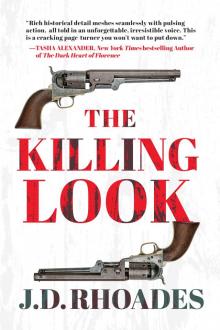 The Killing Look
The Killing Look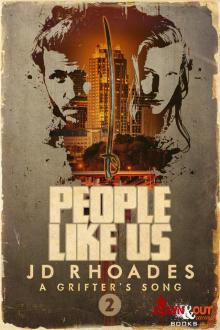 People Like Us
People Like Us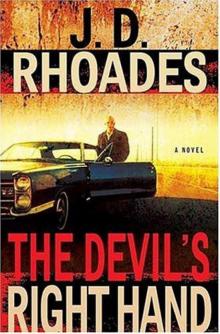 Jack Keller - 01 - The Devil's Right Hand
Jack Keller - 01 - The Devil's Right Hand Safe and Sound
Safe and Sound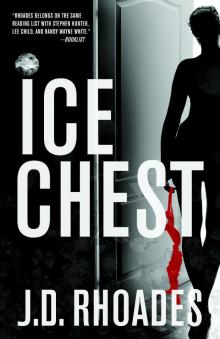 Ice Chest
Ice Chest Breaking Cover
Breaking Cover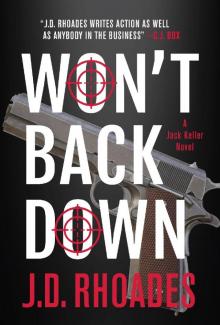 Won't Back Down
Won't Back Down Tony Wolf/Tim Buckthorn - 02 - Broken Shield
Tony Wolf/Tim Buckthorn - 02 - Broken Shield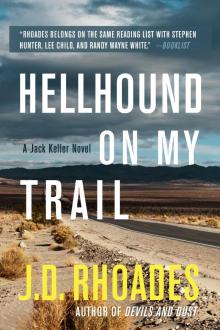 Hellhound On My Trail
Hellhound On My Trail Breaking Cover (Tony Wolf/Tim Buckthorn)
Breaking Cover (Tony Wolf/Tim Buckthorn)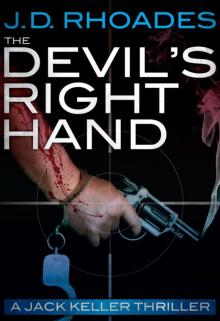 The Devil's Right Hand
The Devil's Right Hand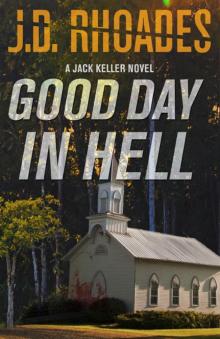 Good Day In Hell
Good Day In Hell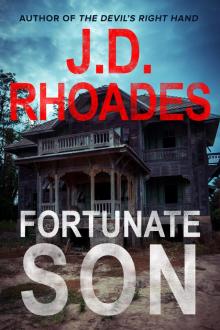 Fortunate Son
Fortunate Son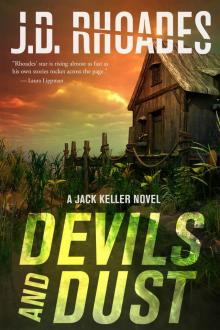 Devils and Dust
Devils and Dust